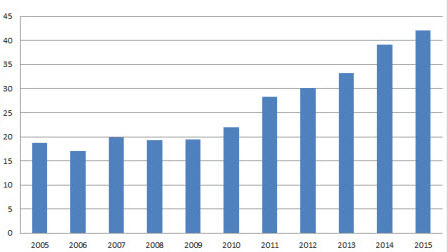News Release from windfair.net
Wind Industry Profile of
Denmark: New record-breaking year for Danish wind power
2015 was another record-breaking year for Danish wind turbines. Overall, the wind turbines generated what corresponds to 42 per cent of the total Danish electricity consumption – the highest figure ever, and the highest proportion for any country. In 2014, the figure was 39 per cent – also a world record.
These figures are based on even more remarkable figures, illustrating that the Danish and European energy systems are undergoing massive changes, and that renewable energy will change the way the electricity systems are operated.

Many hours of 'wind surplus' in the electricity system
For 1,460 hours of the year's 8,760 hours, the western part of the Danish electricity system (DK1) produced more wind power than the total consumption in Western Denmark.
"Hours with wind power production exceeding consumption is not in itself unusual, but the fact that we are now generating surplus power 16 per cent of the time in the Western Danish power grid illustrates that the increasingly fluctuating electricity generation means that we can benefit from imports and exports across borders to an even greater extent. If, for some hours, we have surplus wind energy, the producers sell it to consumers in Norway, Sweden and Germany, and, conversely, we buy hydroelectric power from Norway, solar energy from Germany and power station electricity from Sweden, when it is advantageous for Denmark", says Carsten Vittrup, Energy Strategy Adviser in Energinet.dk's Energy Analysis section.
He stresses the fact that Danish power stations and CHP plants still play a large and important role in the Danish electricity supply. Power stations offer flexibility and generate electricity in periods with low production of wind and solar power.
Fifty-five per cent wind power share in Western Denmark
The majority of the Danish wind turbines are located in Western Denmark, and in 2015 the wind turbines in Western Denmark generated electricity corresponding to 55 per cent of the electricity consumption in Western Denmark.
In Eastern Denmark (DK2), the figure was 23 per cent. In Eastern Denmark, however, the wind power production did not exceed the total consumption in Eastern Denmark at any point.
Out of the year's 8,760 hours, Western Denmark had 65 hours and Eastern Denmark 36 hours with 'negative prices', i.e. hours with electricity generation levels so high that producers must pay to get rid of the electricity. Negative prices provide wind turbine owners, among others, with an incentive to turn off their wind turbines for the few hours during which the supply of electricity exceeds the demand.
A good idea to be in a European market
"Negative prices occur in less than 1 per cent of the time. However, even though there are many hours where wind turbines, solar cells, power stations etc. overall generate more electricity than is consumed, that does not mean that it is an unprofitable operation. On the contrary, it is profitable for Denmark to be part of a large, European market. I usually say that just because a farmer has problems selling his milk three days a year, it does not mean that he will close down his farm, or that it is bad business the other 362 days of the year", says Carsten Vittrup.
The Folketing's objective is that wind energy must constitute 50 per cent of our electricity consumption by 2020. Forecasts indicate that this objective will be achieved.
Despite the fact that the coming years will see even more wind turbines, the number of hours with negative prices is unlikely to change significantly.
2015 was extra windy
Overall, the Danish wind power production exceeded the total Danish electricity consumption for 409 hours in 2015.
One of the main reasons for 2015 being a record year is that was a very windy year compared to 2014, which, from a wind perspective, was a normal year. Conversely, two offshore wind farms, Anholt and Horns Rev 2, were out of operation for one and two months, respectively, due to cable faults. Excluding these cable faults, the wind power share would have been approx. 43.5 per cent.
Wind power share of power consumption over the past ten years
- 2015 42,1%
- 2014: 39.1%
- 2013: 32.7%
- 2012: 30.0%
- 2011: 28.3%
- 2010: 22.0%
- 2009: 19.4%
- 2008: 19.3%
- 2007: 19.9%
- 2006: 17.0%
- 2005: 18.7%
Denmark operating without central power stations for a whole day
2015 was also a spectacular year in other areas. For the first time ever, power was supplied to the Danes for a whole day without any of the country's large central power stations being in operation. This has never happened before for a whole day running.
On 2 September, the Danes were supplied with electricity exclusively from wind turbines, solar cells, local CHP plants and via imports from neighbouring countries.
Denmark also experienced the highest wind power share in any hour in 2015. On the 26 th July between 6 and 7 a.m. wind power production equaled 138,7 percent of the total consumption. I 2014 the last record was set at 132,1 percent.
- Source:
- Energinet.dk
- Link:
- www.energinet.dk/...
